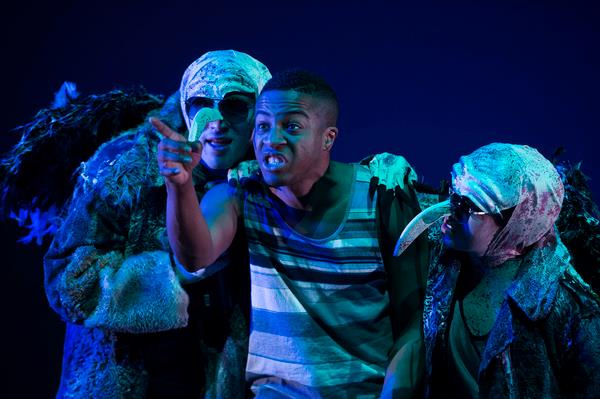“This isn’t life, or death, but something in between, some other geography.” If Christine Evans’s play, Slow Falling Bird, has a central focus in its narrative of Australian xenophobia and the plight of asylum-seeking refugees in the country, it is this notion of simultaneous transition and entrapment. Though it’s an undeniably painful and often perplexing work, punctuated by disjointed scenes and otherworldly presences, Slow Falling Bird is a haunting and transfixing portrait of people on both sides of an inscrutable clash in human history.
The harmful effects of that clash are manifested in the various forms of purgatory, both political and personal, that plague the people living in and surrounding an immigration detention facility that flourished at the turn of the millennium in Woomera, Australia. The perspectives of these damaged individuals comprise a patchwork of voices, as the action switches between the narratives of the refugees and those of the officers forced to deal with them.
Director Rosalba Clemente, a visiting professor from Flinders University in Adelaide, wanted the similarities between these characters to shine through in spite of the inherent conflict of that relationship.“What I was hoping to do was to kind of create all those prismatic reflections in the relationships that kind of carry through electrical currents backwards and forwards, because everyone is in a kind of prison of their own making,” she said.
They may be divided by their positions, but they are united by the ghosts of their respective pasts. For the refugees—Leyla, Zahra, and Mahmoud—that is the war-torn home they left behind for yet another place of chaos. This chaos is evident from the opening scene echoing the beginning of The Tempest, as a shipwreck destabilizes the asylum-seeking refugees and they are washed up on Australian shores.
Rick, played by Caleb Lewis (COL ‘16), is the primary immigration officer and arguably the dominant voice in the play. He acts as the manifestation of conservative masculinity and all Australian hostility toward foreigners, yelling drunkenly at them when they first arrive at the center and attacking them if they refuse to behave properly. Though there is a palpable tension between these three refugees and the two immigration officers that process them at the detention center, however, there is far more happening behind the scenes than most aggressive dialogue reveals. This is where the strange magic of the play emerges.
Life and death intermingle here in haunting ways, as the soul of Zahra’s newborn is left behind in some transitory state between life and death. That spirit sits on a platform suspended above everyone, observing all the action and sometimes whining baby talk to the people below, usually to Rick and his wife, Joy, played by Alex Waldon (COL ‘15), who is dealing with depression following a miscarriage. It’s often a little disorienting to see these interactions between concrete, often disturbing reality and some other intangible realm, as the incongruity of a baby spirit talking to people and life-sized crows raving with drunk immigration officers is difficult to get past.
The best scenes in the play are the quieter moments stripped of that bizarre clutter. Joy’s monologue about her depression, Rick’s one-sided conversation with Zahra about his marriage, and Leyla’s more touching moments with Micko are the vulnerable, personal points of a heavily political play that make it worth watching. It’s these times when the most distant and foreign concepts become the most intimate.
Gonda Theatre
March 26-28, 8 p.m.
March 29, 2 p.m.
April 8-11, 8 p.m.
Photo: Lisa Helfert/Georgetown University
Editor’s Note: A previous version of this article incorrectly stated the names of the play’s characters. The article has been updated and has the correct names.







Just wanted to clarify that the refugees are Leyla, MAHMOUD, and Zahra. Micko is one of the correctional officers. Thanks!
Sorry about that!